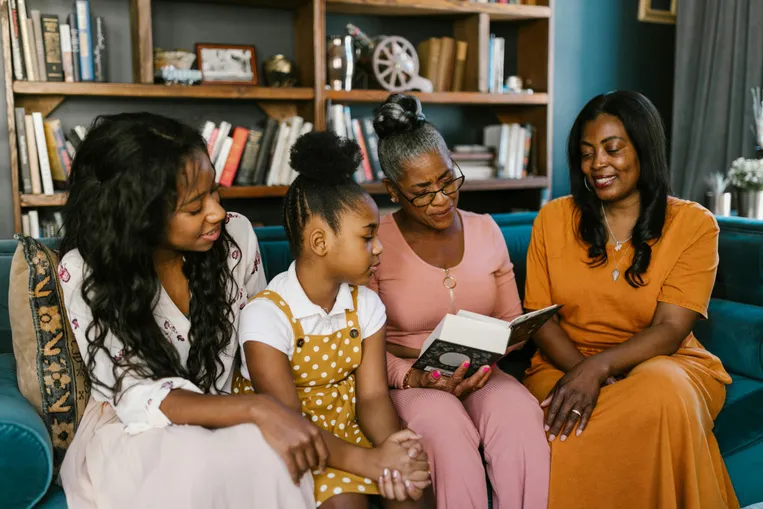
Screens have become the go-to activity for downtime among our kids and teens. But in a world that’s always online, finding a healthy balance has never been more important.
When we suggest a balance, we mean creating space for activities that calm the mind, spark creativity, or improve focus. Recent research from Cambridge University Press highlights how limiting recreational screen time and encouraging reading can boost teens’ wellbeing and cognitive development.
From improving attention to supporting sleep health, we’re breaking down four key reasons why reading is one of the best habits you can support your teen in building.
1. Screen time is Passive, Reading is Active
Scrolling through TikTok or flipping through stories on Instagram is passive consumption. While it can feel stimulating in the moment, your child's brain is mostly skimming information.
Reading is different. It requires active engagement. When your child picks up a book, their brain starts decoding, imagining, and connecting ideas. Every page is a mental workout that strengthens your child’s ability to remember details and process information.
Top Tip:
Activities that require active engagement are tougher to start than passive activities. Make reading a fun activity, encourage your child to do some research, and find the book they want to read.
To boost the active learning process around reading, ask questions about what they are reading.
2. Books Build Attention, Screens Drain It
Sustained attention is directly linked to better grades and problem-solving abilities. However, screens don’t exactly help build this skill. A recent study found that even when we don’t use our phones, simply having a phone nearby reduces our ability to focus on the task at hand.
When your child settles into a book, they learn to follow a narrative thread for a prolonged time, training their brain to focus deeply on a single task. By making reading a daily practice, you’re helping your child strengthen their attention control.
We suggest creating a comfortable space for your child to read, and make it a no-phone zone for everyone, yes, you as the parent included!
ADHD-Friendly Tip:
Children with ADHD may struggle more to settle into a book. Our tip is to help them build their stamina by starting with short sessions, setting the goal to 5 minutes, and going from there.
3. Books Before Bed = Better Sleep
We often underestimate how important sleep is for anyone to function at their prime, especially for growing teens. Sleep is vital in resetting attention, mood regulation, and memory processing.
Researchers found that screen time before bed makes it tougher to fall asleep and leads to poorer sleep quality for children and teens. The main factor is the blue light emitted from our screens. It tricks our brains into staying alert by delaying the release of melatonin, the hormone that signals it’s time to sleep.
Sleep science shows that sleep quality improves when we swap screens for books before bed. Reading is a low-stimulation, single-focus activity which helps settle the mind. We recommend no screens 30 minutes to 1 hour before bedtime, your whole family will sleep longer and better!
4. Reading creates the chance for connection
Research shows that reading together as a family strengthens language skills and family bonds. Shared stories become shared experiences, opening up conversations and creating memories.
November is National Family Literacy Month, so it’s the perfect time to start reading together as a family. Try one or two nights a week. The proven benefits for your children's development, your family's wellbeing, and everyone's screen time balance are invaluable.
Top tip:
Family reading doesn't have to mean everyone silently sits with separate books. Take turns reading paragraphs, act out different character voices, have fun with it!
Final Thoughts
While there is a time and place for screens, it’s important to strike a balance. Kids and teens need to engage in activities that encourage creativity, critical thinking and real connection. That’s why reading is the perfect alternative to screens. Reading strengthens the brain, builds attention, improves sleep health, and creates an opportunity for connection.
This habit isn’t easy to build, it’s difficult to resist a good scroll. But just like any habit, it’s all about small consistent changes that build up over time. So this evening, instead of watching a movie/scrolling through your phones, try reading together as a family.
Sources
Finucane, E., O’Brien, A., Treweek, S. et al (2021). Does reading a book in bed make a difference to sleep in comparison to not reading a book in bed? The People’s Trial—an online, pragmatic, randomised trial. Trials. 22: 873. https://doi.org/10.1186/s13063-021-05831-3.
Galea, C., Jones, A., Ko, K., Salins, A., Robidoux, S., Noble, C., and McArthur, G., (2025). Home-based shared book reading and developmental outcomes in young children: a systematic review with meta-analyses. Front. Lang. Sci. 4:1540562. [doi: 10.3389/flang.2025.1540562](doi: 10.3389/flang.2025.1540562)
Hale, L., Kirschen, G.W., LeBourgeois, M.K., Gradisar, M., Garrison, M.M., Montgomery-Downs, H., Kirschen, H., McHale, S.M., Chang, A.M., and Buxton, O.M., (2018). Youth Screen Media Habits and Sleep: Sleep-Friendly Screen Behavior Recommendations for Clinicians, Educators, and Parents. Child Adolesc Psychiatr Clin N Am. 27(2):229-245. [doi: 10.1016/j.chc.2017.11.014](doi: 10.1016/j.chc.2017.11.014).
Sun, Y-J., Sahakian, B.J., Langley, C., et al (2024). Early-initiated childhood reading for pleasure: associations with better cognitive performance, mental well-being and brain structure in young adolescence. Psychological Medicine. 54(2):359-373. doi:10.1017/S0033291723001381.
Ward, A.F., Duke, K., Gneezy, A., and Bos, M.W., (2017). Brain drain: the mere presence of one’s own smartphone reduces available cognitive capacity. Journal of the Association for Consumer Research. 2(2), pp. 1-16. doi:10.1086/691462.
Unknown author(s) (2024). Blue light has a dark side. Harvard Health Letter. Available at: https://www.health.harvard.edu/staying-healthy/blue-light-has-a-dark-side.
How many core habits and skills is your child missing?
Take our short quiz and find out.
Take our quiz
_h7GvE.webp)
_Zn0YYX.webp)
_Z2dC98e.webp)